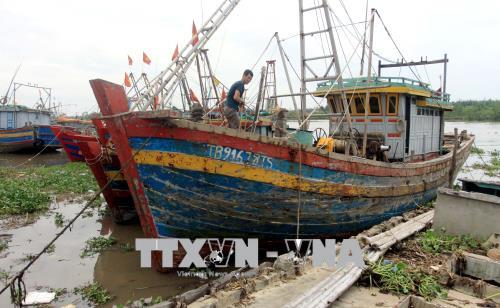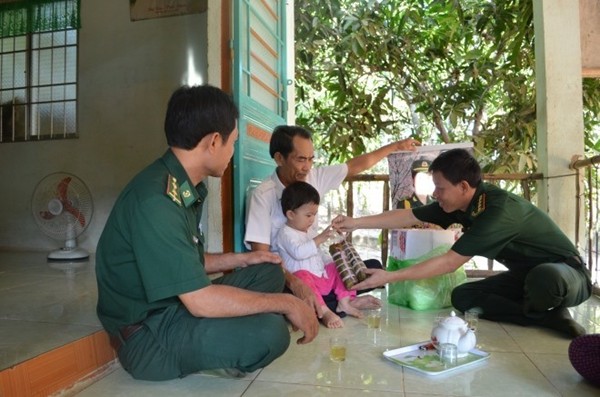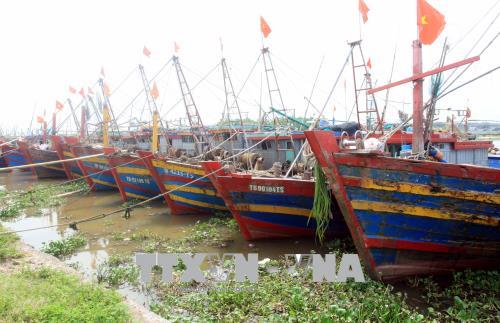 Storm Mulan heads toward northern coast
Storm Mulan heads toward northern coast
Home > Socio – Culture
Khmer soldier adopts comrade’s HIV-infected kid
By VNA 12/28/2017 08:30 |

Representatives of Gành Dầu border post visit a poor family on the ocassion of Tết (Lunar New Year) festival. — Photo laodong.com.vn
KIÊN GIANG — Most people know now that HIV/AIDS cannot be transmitted easily.
They know that it cannot spread by merely touching or talking to an infected person.
However, the ostracism of people with HIV/AIDS has persisted in Vietnamese society, despite many awareness campaigns, as people adopt a better safe than sorry attitude.
Not only do such people decide it’s better to stay as far away from the “doomed” people, they are even wary of those who interact normally with HIV/AIDS infected people.
The fear and ostracism is even more difficult to overcome in rural areas where misunderstandings and fear continue to surround the condition.
Danh Trường Danh, a Khmer solider, is an exception.
The resident of the Mekong Delta Province of Kiên Giang has braved all the ostracism and fears, adopting two children, one with HIV, of a comrade who succumbed to the dreaded disease.
Not only has Danh adopted the children, he has lavished as much care on them as his own offspring, if not more.
The Khmer border guard looks older than his 50-something years, the tough life having taken its toll, but a smile never deserts his face.
He happily introduces the joys of his life, the two adopted orphans, the boy, Quốc Bảo, and the younger girl, K.C. – to anyone visiting his humble home.
“K.C. is in 9th grade, and Quốc Bảo has grown into quite a beefy man. He now works with the military command of Gành Dầu Commune.”
It is hard for anyone to believe that the healthy-looking secondary school student was at death’s door 14 years ago, with everyone assuming she had no chance to survive.
“The whole thing started in 2004. I adopted the children after my comrade died of AIDS. At my commanding officer’s suggestion, I got blood tests done at the provincial hospital. It was very painful to learn that K.C. was in the final stage of AIDS.”
At the final stage of the ‘disease of the century’ where the body’s immune system is heavily compromised - boils, scabs, swellings and wounds oozing blood and yellow puss start to pop up more frequently and do not heal. Danh was not put off. He still bathed her, washed her clothes, taught her, took her to school, and hugged her tightly to calm her down during nights when her body was racked by searing pain.
Reminiscing about those difficult days, Danh said be believes his love and unwavering care for his child carried her through. It was not just taking care of her daily needs, medicines or treatment, it was giving her the will to live, though love.
Overcoming discrimination
“One must really understand the social context and Danh’s own family situation back then to fully appreciate the silent sacrifices Danh has made,” said Major Dương Thanh Hoàng, deputy political commissar of the border post and Danh’s colleague.
In the rural community they are based in, understanding of HIV/AIDS was really limited.
In addition, just four days before K.C.’s biological father breathed his last, Danh’s own first-born son, Danh Trường Quốc, 12 years old then, drowned in a stream on his way home. Danh’s wife, Lê Thị Ngọc Bích, was also expecting, and the child was just a few months away.
In the midst of such a tragedy, no one would have Danh to keep a promise he made to his dying comrade, and have the children, who’d also lost their mother to AIDS, cared for by an orphanage.
Danh, however, welcomed the two children into his family despite his personal grief.
“Of course, bringing up two additional children began a period of serious struggle for me,” Danh said.
Since depending on support from relatives on both his and his wife’s side was not a long-term solution, since nobody was very well off, the couple decided to open a small groceries store.
After K.C. tested positive for HIV/AIDS, Danh had to seek support from colleagues to cover medical treatment for the little girl. But misfortune never comes singly. When word got around that the adopted daughter was an HIV/AIDS patient, people in the area practically shunned the couple’s store.
Witnessing Danh’s struggle, many advised him to send K.C. to an HIV/AIDS centre, where she would be cared for by professional medical workers and the “burden on his family would be lifted.”
Danh confessed that at first, he thought it was actually a sound idea, and did some preparations. But, in the end, he changed his mind.
“Seeing her own relatives, my relatives, the community at large, all shunning her, I felt like I was the last emotional support for her. If I failed her, no medicine could possibly help her,” Danh said.
So he continued to tirelessly do his official work and take care of the girl. Countless times Danh had to cross the forest in the middle of night to get from Gành Dầu post to the provincial hospital when K.C. caught raging fevers.
Promise to a dying comrade
“It’s comradeship that pulled me through,” Danh said.
Born to a working Khmer family in Gò Quao District of Kiên Gaing Province, Danh easily made friends with other officers, the majority of whom shared his poor background.
When one of them, D.T.G., was on his deathbed, he pleaded with Danh to take care of Quốc Bảo and K.C., and the friend followed through the promise, even managing to convince his wife and biological children to help him care for the two adopted ones.
When his biological daughter grew up and K.C.’s health started to stabilise after gaining access to ARV therapy under the national HIV/AIDS care and treatment programme, Danh’s wife Bích could go work for an aquaculture company. When the fishing season ended, she took up all sorts of odds-and-ends jobs, including opening up a makeshift ‘daycare centre’ right at her home to care for local children, to share the financial burden with Danh.
Fortunately, since K.C.’s health has gotten better, locals are no longer shunning the family. Danh’s family is still poor and barely making ends meet, but a certain sense of reassuring stability has come.
However, the future is still rife with uncertainties. As Việt Nam has entered the middle-income group of countries, international support for HIV/AIDS treatment, which has allowed patients to enjoy free medicines – has started to dwindle. Now, treatment and medicines will be available only through the government-sponsored health insurance starting from 2018, which would require monthly premiums that may be too much for struggling families like Danh’s.
The Health Ministry has said that it is revising regulations to make sure that HIV/AIDS patients in the country are given health insurance cards, and thus be eligible for heavily subsidised medicines.
Today, Major Danh Trường Danh, deputy head of Gành Dầu border post, is clear about on thing, no matter what the situation is with government support.
“My wife and I will still carry on, until we are no longer able to do so.
“I have never thought of what I have been doing as an achievement, although I have been praised a lot by people. I believe that raising orphaned children of comrades is what any solider would do if they were in my shoes.” — VNS
Photo
 Storm Mulan heads toward northern coast
Storm Mulan heads toward northern coast
 Storm Mulan heads toward northern coast
Storm Mulan heads toward northern coast
 Storm Mulan heads toward northern coast
Storm Mulan heads toward northern coast
 Storm Mulan heads toward northern coast
Storm Mulan heads toward northern coast